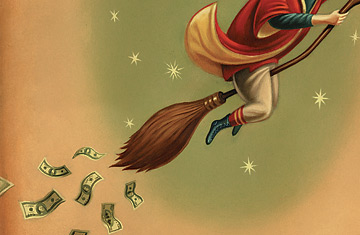
(2 of 2)
But Scholastic's reach can extend only so far, and once the books are delivered, security is in the hands of the bookstore owners, all of whom sign a long, tightly worded legal agreement requiring them to keep the boxes unopened until 12:01 a.m. on July 21. "No one here sees them," says Kim Brown, vice president of merchandising at Barnes & Noble, which hires an outside security firm to guard the padlocked trucks in which it stores its copies of Deathly Hallows. "We have our fulfillment centers cordon off a special section for the Harry Potter books," says Sean Sundwall of Amazon.com. "Only a very small number of people are allowed to look at it—or breathe on it—and even a smaller number of people can touch it."
That's all well and good for the big players, but libraries and smaller bookstores aren't set up for Azkaban-level security. "The boxes say HARRY POTTER on them, so people get all excited," says Dana Harper, who co-owns Brystone Children's Books in Fort Worth, Texas, with her mother and sister. "Behind the counter, we have them covered with a cloth before we cut into them, just in case. We do get nervous that someone will break in, but that hasn't happened yet." For owners of small businesses, trapped between the demands of millions of ravenous fans and those of a large corporation protecting a major asset, the experience can be disconcerting. "I can't even tell you where the books will be!" says Liz Murphy, owner of the Learnéd Owl Book Shop in Hudson, Ohio. "We had to sign our life away."
It's all in the service of that magic moment, when readers turn the first page of what Rowling swears will be the last Harry Potter novel ever published. When Scholastic executives start in on the experience of reading J.K. Rowling, there's pretty much no limit to how elevated the rhetoric can get. "Each of us can picture that midnight moment that we've all been talking about," says Levine. "We all love to be at those parties. All of us are doing it for that intense moment when we see the realization of our whole lives right in front of us!"
If the goal of Scholastic's strenuous secrecy campaign is to turn the release of Deathly Hallows into an event comparable to the premiere of a movie or the series finale of a beloved TV show, then by all means, mischief managed. There's certainly more than a whiff of "Who shot J.R.?" in the air, and a satisfying sense that the written word is for once getting the hype usually accorded only to hipper and newer-fangled media. "The kids are very excited," says Harper. "The adults are just as excited. If they're toward the counter when the boxes are sliced into, you might hear a sort of screaming or some oohs and ahs and breaths being taken in."
But with all that emphasis on the magic moment, there is the risk that people will forget why books are, in fact, books and not movies or TV shows. They're not about midnight parties or hype or even moments, however magical. Reading is, after all, the most solitary and contemplative and long-lasting of all aesthetic pleasures. "We'd just like to sell it like other books," Harper admits, a little wearily. "Just get it in and sell it. It can be kind of a circus." If Harry were real, he would find all the fuss intensely embarrassing. After all, if all readers cared about was the outcomes, then why would they turn out in such numbers to see the movie versions of the books, the fifth of which (Harry Potter and the Order of the Phoenix) hits cinemas 10 days before the seventh book is published.
Ironically, the Harry Potter brain trust could be guilty of underestimating the power of the books it's trying so energetically to sell. The magic-moment strategy promotes a myth about Rowling's work—and reading in general—which is that the pleasure of a book is a fragile enchantment that's easily dispelled. On June 18 a hacker calling himself "Gabriel" announced on a website that he had done exactly what the Harry Potter brain trust most feared: stolen the text of Deathly Hallows. Explaining that he had gained access to a Bloomsbury employee's computer using an e-mail-borne Trojan-horse program, he posted what he claimed were key plot points from the book (which won't be repeated here). He framed his actions as a Christian counterattack against a work that promoted the "Neo-Paganism faith." Quoth Gabriel: "We make this spoiler to make reading of the upcoming book useless and boring."
The spoilers are almost certainly fake. Gabriel didn't offer a shred of evidence supporting their authenticity, and anyway, boasting about things that you haven't actually done is pretty much what hacker culture is all about. But even if the spoilers were genuine, it wouldn't matter.
On this point, both hacker and publisher share a key misunderstanding of what reading is all about. People read books for any number of reasons; finding out how the story ends is one among many and not even the most important. If it were otherwise, nobody would ever bother to read a book twice. Reading is about spending time with characters and entering a fictional world and playing with words and living through a story page by page. The idea that someone could ruin a novel by revealing its ending is like saying you could ruin the Mona Lisa by revealing that it's a picture of a woman with a center part. Spoilers are a myth: they don't spoil. No elaborate secrecy campaign is going to make Harry Potter and the Deathly Hallows any better than it already is, and no website could possibly make it useless and boring.
—with reporting by Kristina Dell and Laura Fitzpatrick